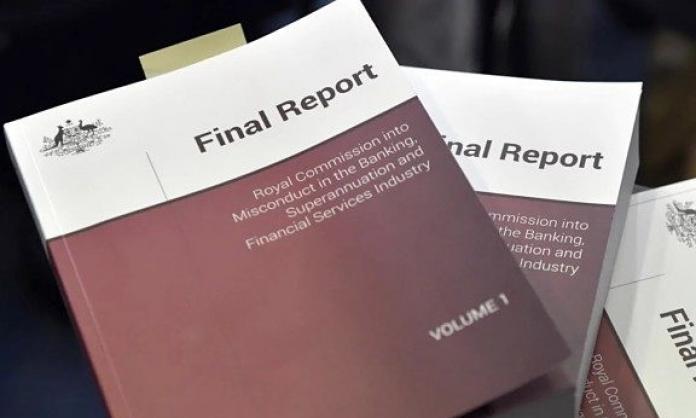Tens of millions of dollars outlaid on the Commission’s hearings. Ten thousand submissions from aggrieved customers. A mountain of corporate crime unearthed. But the main outcome of the Royal Commission into Misconduct in the Financial Services Industry has been to let the big four banks off virtually scot-free.
A few heads may roll, some spivs may shut up shop, but other than that it’s business as usual in the executive suites in Collins Street and Martin Place. The perpetual motion, profit-gouging machine that is Australia's banking oligopoly will roll on.
As the Financial Review’s Chanticleer column put it the day after the report was released: “The big four banks can cheer because there is nothing in the Hayne report to prevent them earning about $30 billion this year and even more thereafter”. Little wonder that bank shares jumped 4 to 7 percent, a $20 billion boost to their market value.
Crimes
The royal commission brought into the spotlight corporate malpractices reported on by journalists and whistleblowers for at least a decade. These include banks, financial advisers and insurance companies charging fees for services they did not provide, or charging fees to dead people.
When vulnerable customers were sold unwanted, unnecessary, unaffordable or unethical products, bank staff were rewarded handsomely for doing so. Bank-owned retail super funds sucked billions of dollars in fees out of Australian retirement savings and poured them into the coffers of the banks that own them.
Clients have been broken, defrauded or bankrupted by the banks but lacked any meaningful opportunities for redress or compensation. And the very bodies meant to safeguard community interests and ensure bank probity have been captured by those they are meant to regulate.
Coalition cover
The Abbott and Turnbull governments tried for years to block the royal commission, voting against it 26 times. In 2016, then treasurer Scott Morrison described Labor’s call for a commission as “a populist whinge”; financial services minister Kelly O’Dwyer reckoned it was “reckless and ill conceived”. Pitching into the debate in 2017, former PM John Howard said that the idea was “rank socialism”.
Many journalists simply echoed the politicians. The Australian’s business commentator John Durie called an inquiry “a complete waste of time and arguably a touch dangerous”. Murdoch stablemate Terry McCrann said that a Royal Commission would be “completely unnecessary, politically cynical, stupid and potentially harmful”.
The Coalition government has run interference for the banks for years. In its 2014 budget, the Abbott government cut the funding of the Australian Securities and Industries Commission (ASIC) by $120 million over four years. The Turnbull government sliced off another $26 million in 2018. Even this toothless tiger is too much for the Coalition.
That the Coalition is so eager to champion the banks is no surprise. The banks are a natural constituency for the conservative parties, whose ranks are chock full of former bankers. Treasurer Josh Frydenberg was director of global banking at Deutsche Bank for five years. Kelly O’Dwyer was a senior banker at NAB and Malcolm Turnbull was a partner at Goldman Sachs. The banks value their good mates in the government: in the past two years the big banks have donated $700,000 to the Coalition parties.
It was only in November 2017, after years of stonewalling, that the Turnbull government shifted when members of the National Party came under pressure from their own voters.
Even then, it wasn’t the government but the banks themselves that took the initiative. Recognising that a royal commission was now inevitable, they took control of the process, negotiating with the government to set out the terms under which it would be held, including that the whole thing would be over in 12 months.
Feeble recommendations
Given that the royal commission was the product of a deal between the government and the banks, it is not surprising that its recommendations are so feeble.
Justice Hayne’s recommendations may drive some shysters out of the industry – the ticket clippers who earn money by slugging clients with adviser fees for years. The big banks will be pinged for $850 million in compensation to those they charged for services never provided, although this is chickenfeed for these corporate giants. Some executives may lose their jobs; one or two may even be forced to appear in court to account for their actions.
But in the greater scheme of things, Hayne’s recommendations manifestly fail to measure up to the task of reining in the banks. The commission identified that whenever profit and the client’s best interests come into conflict, profit wins out. But nothing in the recommendations addresses this basic fact.
There is no mention, for example, of breaking up vertically integrated companies like Westpac and AMP, which combine banking and wealth management, a toxic structure responsible for much of the most despicable behaviour revealed by the commission.
No mention of directly challenging remuneration systems that encourage bankers to foist unsuitable products onto customers and no caps on executive bonuses.
No mention of phasing out for-profit retail superannuation funds that rob retirees of tens of thousands of dollars in excessive fees and poor returns.
No recommendations for the creation of a serious enforcement body with teeth to oversee the public interest. Far from it; Hayne wagged his finger at ASIC but has left it in charge of industry oversight.
No direct referrals of criminal or civil prosecutions to the Australian Federal Police or the Director of Public Prosecutions or recommendations that boards of directors of entities involved in misconduct be held accountable. It’s a classic case of one law for them, one for us. If a worker robbed a bank, they’d be in jail for years. But the bank executives have robbed us all and walk away.
And if Hayne’s recommendation that banks be barred from paying mortgage brokers to sign up new customers is implemented, the big four banks will thank him because it will save them millions of dollars in commissions to the brokers. It will also direct home buyers back into their arms, boosting their share of the market above the 80 percent they already account for.
Swept under the carpet
The government now says that it will implement all but one recommendation: banning trailing commissions for mortgage brokers. But given the Coalition’s record of coddling the banks, even if they win the coming federal election, we can expect them to sweep under the carpet everything even mildly threatening to big business.
The ALP opposed the call for a royal commission for several years and regularly voted with the government to defeat Greens bills demanding one as late as 2015, before adopting it as policy in the following year.
Labor is now bashing the Coalition for defending the banks and will run this line all the way to the federal election. But if Labor wins office, expect to see some of its rhetoric toned down. Labor also has good relations with the banks: the party’s federal office received $560,000 in donations from the big banks in the last two years; the state branches also enjoy bank largesse.
But these donations are just icing on the cake. The main issue is that Labor, like the Coalition, is completely committed to securing the fortunes of the top end of town, even if it may tut-tut at some of its excesses. It was Labor that deregulated the banks in the 1980s and sold off the Commonwealth Bank in the 1990s, creating the environment so conducive to today’s criminal behaviour.
Profit comes first
The main problem that no one connected to the industry, or the politicians in the major parties, wants to touch is that banking is far too valuable to be left in the hands of the private sector.
Private ownership means that the financial needs of the community are subordinated to the profit interests of a few giant companies that hold the rest of us to ransom.
Credit oils the wheels of the entire economy. If threatened by stricter regulation, the banks have the power to strangle the economy by restricting lending. A credit squeeze would cause bankruptcies, mass redundancies and a crash in the housing market. This is an enormous power in the banks’ hands, so obvious that they rarely need to threaten it openly. It is blackmail, pure and simple. But unlike other blackmailers, the bankers will never see the inside of a jail cell.
Further, because the banks are “too big to fail”, they know that they can fall back on taxpayer support when they need it. The big four banks are a cosy government-protected cartel underwritten by a federal government backstop that ensures they can borrow on financial markets at discounted rates, boosting their bottom lines. It’s a textbook case of privatisation of profits, socialisation of losses.
The first step in fixing the industry has to be to bring credit under public control. That means nationalising the banks and ensuring that they operate on the basis of public need, not the profits of the few. That would involve lending to socially useful industries rather than property speculators who contribute to wild booms and busts in the housing markets.
But cleaning out the pigsty involves more than that, significant though it would be. We have to ask other questions too.
Why is people’s financial security in the hands of financiers who make a fortune selling home insurance, income protection insurance, disability insurance and the like, and who have every interest in denying claims to bolster their bottom lines?
Why is income support for many of us in our old age increasingly dependent on superannuation, which is nothing but a gamble on our futures?
Why is one of the most basic rights, the right to shelter, offered to most of us only as a commodity, to be financed and built by banks and property developers only if they can see a buck in it?
If we need a publicly owned banking industry to meet public needs, we also need decent social security and welfare and a massive expansion in good quality public housing. In other words, we need to turn upside down the whole basis on which our economy today is based, to build a world in which human need is put ahead of profit and the interests of the many are put ahead of those of the few.









